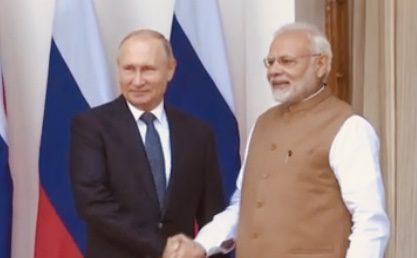India reminds Japan that Asian independence exists: Quads and Russia
Sawako Utsumi and Lee Jay Walker
Modern Tokyo Times

The government of India remained steadfast against Australia, America, and Japan by refusing to condemn the Russian Federation during the recent Quad meeting. Indeed, despite China and the Russian Federation having cordial relations, the Russian Federation provides India with state-of-the-art military equipment. Therefore, the longevity of friendship between India and the Russian Federation preserves over the whims of America and Australia (not a true Asian nation by the sense of the European colonial angle) – and Japan that is increasingly turning on the anti-China and anti-Russian Federation clock.
India reminded the Quad groups that these four nations are meant to be focused on the Asia-Pacific region and the geopolitical ambitions of China. According to America, Australia, and Japan, the nation of China threatens the region. India, despite having tensions with China, is more nuanced. Hence, India evaluates each situation with China, followed by appropriate national security measures. Therefore, India is a member of Quads from a national security position while still being part of the Shanghai Cooperation Organisation (SCO) and the economic bloc of BRICS (Brazil, Russia, India, China, and South Africa).
The eight members of the SCO concern China, India, Kazakhstan, Kyrgyzstan, Pakistan, the Russian Federation, Tajikistan, and Uzbekistan – with several observer states and dialogue partners from Belarus to Sri Lanka. India joined Quads for national security concerns and not to create convulsions with China. However, the nations of America, Australia, and Japan sprout anti-China rhetoric at the drop of a hat.
The administrations of Yoshihide Suga (former leader) and the current leader Prime Minister Fumio Kishida is increasingly belligerent toward China and the Russian Federation. Kishida is the most anti-Russian Federation leader in recent memory and an individual who rubber-stamps the whims of America with gusto – got a reminder from India that Asian independence exists within this important democratic state.
The administration of Prime Minister Narendra Modi of India “underlined that the Quad must remain focused on its core objectives of promoting peace, stability and prosperity in the Indo-Pacific region.” He also refused to condemn the Russian Federation and become a mouthpiece of America and Australia – unlike Japan. Therefore, pressure emanating from America, Australia, and Japan, failed to alter India’s independent position concerning the Russian Federation.
China and the Russian Federation have cordial relations with each other. Similarly, both nations have strong ties with Iran and Pakistan. India understands its own geopolitical position and seeks to strengthen ties with all nations – where possible. Also, why would Modi seek to aim anti-Russian Federation statements at a meeting focused on the Asia Pacific – and with having cordial relations with the Russian Federation?
However, unlike India, the political elites in Japan have now added the Russian Federation to its negative relations with China, North Korea, and South Korea in Northeast Asia. This reality concerns the increasing rubber-stamp nature of the last two administrations – indeed, the leader before both individuals (Shinzo Abe) refused to take an anti-Russian Federation stance. However, with America’s increasing containment policies of China, the more Japan is becoming assertive (American military bases throughout the country) and condemning China over a host of issues (Taiwan, Hong Kong, human rights, and others).
The Russian Far East is now facing an overtly hostile Japan that took an anti-Russian Federation approach immediately concerning the Ukraine crisis when America sought an international coalition against the Russian Federation. Hence, Japan is stoking the crisis in Ukraine aimed at the Russian Federation, just like Japan is stoking Taiwan aimed at China. Therefore, Japan is increasingly “throwing caution to the wind” in Northeast Asia.
Overall, the recent Quads meeting confirmed that India is an independent Asian power. However, in the opposite direction, Japan confirmed that it is intent on rubber-stamping the policies of America and that it isn’t an independent nation.
Agent Orange on Vietnam, Operation Condor in South America, Iraq, and countless other events have witnessed the armed forces of America committing atrocious massacres on several continents. Japan at no point decided to put potent economic sanctions on America. Likewise, the friends of Japan include France (which involves itself in countless conflicts), Indonesia (which occupies West Papua), Saudi Arabia (Saudi-led coalition is at war with the Houthis in Yemen), Turkey (which occupies Northern Cyprus and Northern Syria), the United Kingdom (involves itself in countless conflicts), and so on.
In other words, Japan can’t hide its increasingly hostile policies towards China and the Russian Federation. This concerns human rights and democracy. It is like the latent nationalism of the Meiji Restoration is returning to Japan in recent years within the Japanese Foreign Ministry aimed at regional nations in Northeast Asia.
It is hoped that a future administration in Japan will reset the clock. If not, the geopolitical region of Northeast Asia faces a powder keg – especially given the history of America.

PLEASE DONATE TO HELP MODERN TOKYO TIMES
Modern Tokyo News is part of the Modern Tokyo Times group
DONATIONS to SUPPORT MODERN TOKYO TIMES – please pay PayPal and DONATE to sawakoart@gmail.com
http://moderntokyotimes.com Modern Tokyo Times – International News and Japan News
http://sawakoart.com – Sawako Utsumi personal website and Modern Tokyo Times artist
https://moderntokyonews.com Modern Tokyo News – Tokyo News and International News
PLEASE JOIN ON TWITTER
https://twitter.com/MTT_News Modern Tokyo Times
PLEASE JOIN ON FACEBOOK